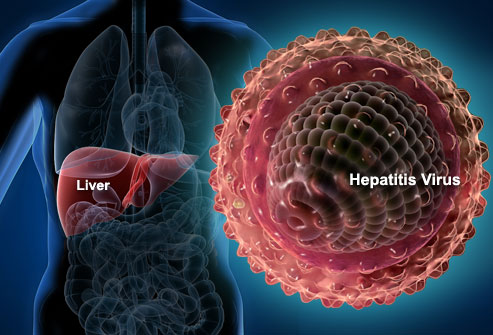Hepatitis is the inflammation of the liver. Although hepatitis can be the symptom of many illnesses, including autoimmune diseases, it is most often caused by a viral infection.
There are five main types of viral hepatitis: A, B, C, D and E. Of those, Hepatitis A, B and C are the most common types.
Symptoms
Some people with hepatitis have no symptoms, When symptoms occur, they can include:
• jaundice (a yellowing of the skin and eyes)
• abdominal pain
• loss of appetite
• nausea and vomiting
• diarrhea
• fever

Causes
Hepatitis can be caused by drugs, alcohol or other toxins, by infection with bacteria, viruses or parasites, or when the body mistakenly attacks the liver (an autoimmune disease), according to the World Health Organization. Hepatitis viruses are the most common cause of the illness.
Hepatitis A and E are acute (short-term) viral infections typically transmitted through food or water contaminated by fecal matter, the WHO says. The primary sources of the hepatitis A and E viruses are raw or undercooked food, food handled by people who have not properly washed their hands and water contaminated by animal or human waste. Hepatitis E is rare in the United States, but common in other parts of the world. Hepatitis B is spread through exposure to infected blood, through sexual contact with an infected person, or during childbirth, when the virus can be transmitted from mother to child.
Hepatitis C is mainly spread through contact with the blood of an infected person, according to the CDC. Such contact can occur when people share needles to inject drugs. Less commonly, hepatitis C can spread through sex or childbirth.
Hepatitis D is also spread through contact with blood, but infections with this virus only occur when someone is also infected with hepatitis B. Injection drug users are at greatest risk for this type of hepatitis.
Diagnosis
Acute liver infection is usually suspected when patients have symptoms such as jaundice and fatigue. Blood tests can then be used to determine the presence and quantity of hepatitis virus and antibodies in the body. The doctor may suggest getting a liver biopsy if chronic hepatitis B and C is suspected and there’s a chance of liver damage.
Since liver damage can occur before there are any overt signs and symptoms, routine screenings for hepatitis B and C are recommended for people who have a high risk of coming in contact with the viruses.
How hepatitis is treated
Treatment options are determined by which type of hepatitis you have and whether the infection is acute or chronic:
Hepatitis A
Hepatitis A usually doesn’t require treatment because it’s a short-term illness. Bed rest may be recommended if symptoms cause a great deal of discomfort. If you experience vomiting or diarrhea, follow your doctor’s orders for hydration and nutrition.
The hepatitis A vaccine is available to prevent this infection. Most children begin vaccination between ages 12 and 18 months. It’s a series of two vaccines. Vaccination for hepatitis A is also available for adults and can be combined with the hepatitis B vaccine.
Hepatitis B
Acute hepatitis B doesn’t require specific treatment. Chronic hepatitis B is treated with antiviral medications. This form of treatment can be costly because it must be continued for several months or years. Treatment for chronic hepatitis B also requires regular medical evaluations and monitoring to determine if the virus is responding to treatment.
Hepatitis C
Antiviral medications are used to treat both acute and chronic forms of hepatitis C. People who develop chronic hepatitis C are typically treated with a combination of antiviral drug therapies. They may also need further testing to determine the best form of treatment. People who develop cirrhosis (scarring of the liver) or liver disease as a result of chronic hepatitis C may be candidates for a liver transplant. Currently, there is no vaccination for hepatitis C.
Hepatitis D
No antiviral medications exist for the treatment of hepatitis D at this time. Hepatitis D can be prevented by getting the vaccination for hepatitis B, as infection with hepatitis B is necessary for hepatitis D to develop.
Hepatitis E
Currently, no specific medical therapies are available to treat hepatitis E. Because the infection is often acute, it typically resolves on its own. People with this type of infection are often advised to get adequate rest, drink plenty of fluids, get enough nutrients, and avoid alcohol.
Tips to prevent Hepatitis
Hygiene
Practicing good hygiene is one key way to avoid contracting hepatitis A and E. If you’re traveling to a developing country, you should avoid:
• local water
• ice
• raw or undercooked shellfish and oysters
• raw fruit and vegetables
Hepatitis B, C, and D contracted through contaminated blood can be prevented by:
• not sharing drug needles
• not sharing razors
• not using someone else’s toothbrush
• not touching spilled blood
Hepatitis B and C can also be contracted through sexual intercourse and intimate sexual contact. Practicing safe sex by using condoms and dental dams can help decrease the risk of infection..